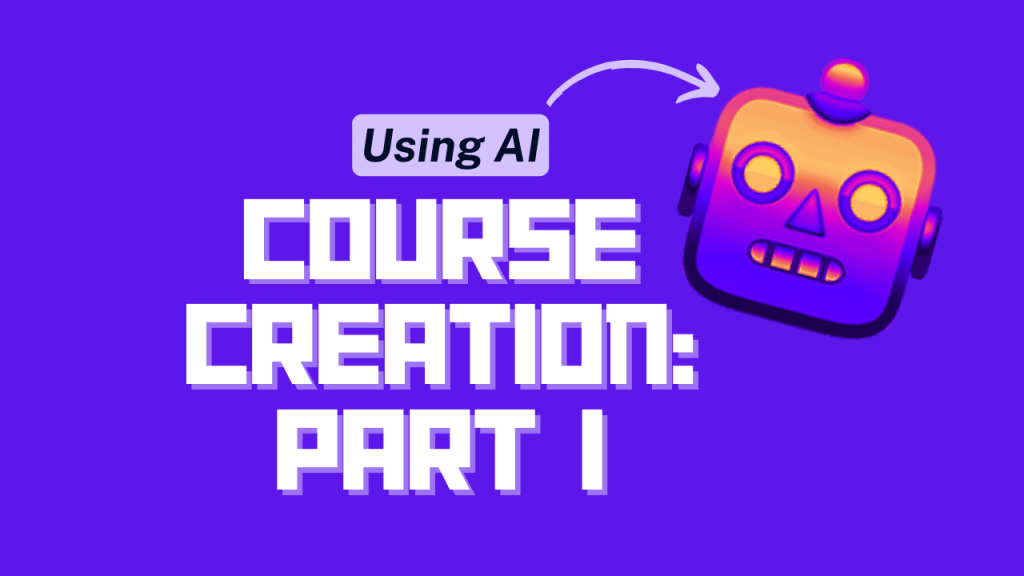Hey Prompt Entrepreneur,
This week we’re looking at course creation.
With this business model you package up your expertise into a course which you sell to people who want to learn from you.
Over the week we’re going to go into detail about:
- Part 1: Course Topic Selection
- Part 2: Course Structure
- Part 3: Course Scripts
- Part 4: Course recording and editing
- Part 5: Course marketing
We’re going to be focusing on Udemy in particular, but these lessons are more widely applicable to Coursera, Skillshare, Youtube or self-hosting your own course.
I’m focusing on Udemy because it has the largest learning base. We’re going to be tapping into that existing audience of learners rather than building an audience from scratch.
Also, this is the platform I’ve personally had the most success on and so am therefore most qualified to talk about. Better than me making stuff up!
Here’s one of my courses on Udemy which has 26,000+ students and 4.6 star average review on 458 ratings.

Once you’ve created your course though you can test it out on different platforms. Or publish it on multiple platforms – just make sure to check the T&Cs on each platform for exclusivity clauses.
Today we’re going to focus in on what exactly your course is going to be about – the topic and your particular unique selling point.
Let’s get started:
Course Topic Selection
1. Topic brainstorming
You could create a course about something you don’t know anything about.
AI will allow you to do this.
However, the end result will be uninspired, dull and probably full of errors!
Instead we’re using AI to help us with the process of creating a course – not to do all of the work for us! Therefore the course we are creating should be a topic that we have both knowledge and skills in.
You may already know what this is. If so great; skip to the next step. But if you are at a loss we’ll use ChatGPT to help come up with ideas.
Let’s start with a simple prompt to start thinking about topics.
Act as an online education specialist.
I am preparing an online course and want assistance with the course ideas.
My areas of expertise are in: [insert skills/knowledge]
Generate 10 unique course ideas related to each area of expertise.
Please also suggest a key learning objective for each course.Where the prompt says [Insert skills/knowledge] add as many of your areas of expertise as possible. The more you add the more ideas ChatGPT will throw at you.
These can be professional expertise from your work or more personal skills and knowledge from hobbies and interests. Don’t limit yourself at this point – we want to go wide and get the creative juice flowing.
Prompt Output 💬
Here is an example output for “digital marketing” which is one of my areas of expertise.
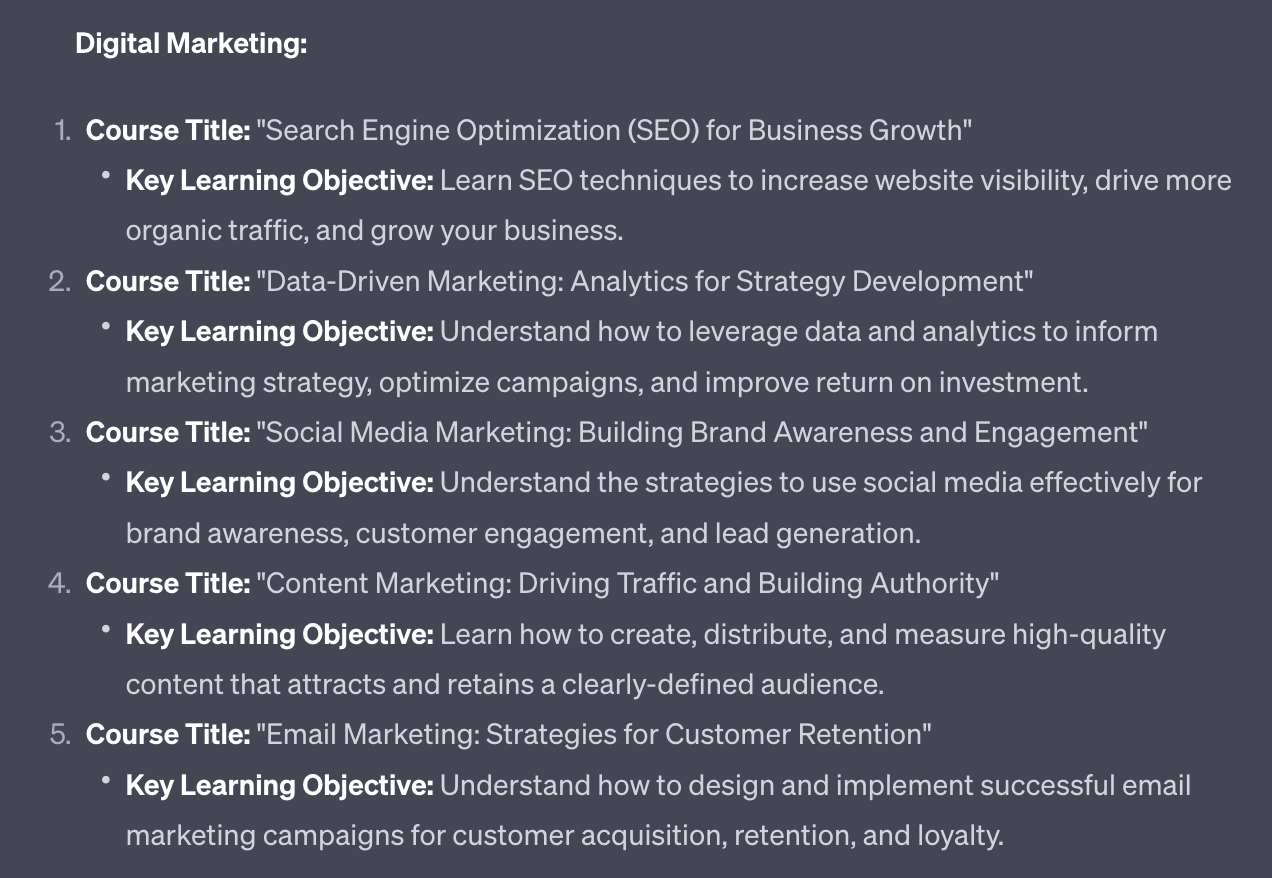
Note the multiple topics here: SEO, data-driven marketing, social media marketing, content marketing, email marketing etc.
These are the sort of topic ideas we want to extract and use in the next step. So note down any that are of interest and we’ll be finding out which are good course ideas to pursue.
2. Udemy Instructor Insights
Once you have a handful of potential course topics in hand we need to check how the market looks.
It’s not enough to build a course that we are interested in. It also needs to be something that:
- Has lots of interested learners
- Has competition we can beat
For this we’ll use Udemy’s Marketplace Insights tool.
You’ll need an Instructor’s account on Udemy to do this. This is free and quick to set up here. Go ahead and make an account.
Once you are in your instructor’s account go to Tools > Marketplace Insight tool. You’ll see a search bar like this:

Go ahead and type in one of the topics from step one. Chances are it’s a topic on Udemy – if not try variations of the word and you’ll find it. Udemy has a huge range of topics.
You’ll be presented with a HUGE amount of information about the topic.
For the topic “ChatGPT” for instance I can see that demand and competition is high. Unsurprising considering the top teacher makes $65,000/month.

I can also see the top keywords people use to find the content as well as related topics:
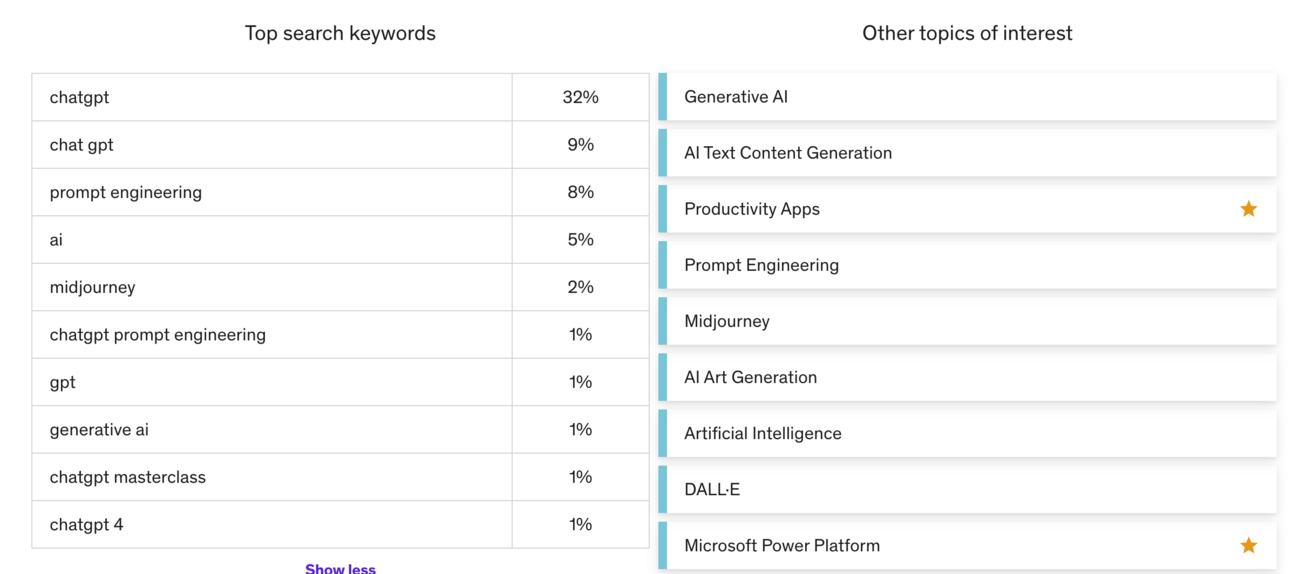
Make sure to investigate those other topics if they are relevant to your skills. Especially those with stars – those have high demand and low competition.
Further down the page you’ll also be shown the top courses in the topic, their number of sales and their average review ranking.
Lots and lots of valuable market information that we’‘ll be using to decide our topic.
Right now go through your topic list from step 1 and look for high demand topics that (ideally) have low or medium competition. These will be the sweet spot.
Collect up a few of these as your shortlist. Feel free to choose a topic now or continue to the next step with a few options if you are still uncertain.
3. Competitive analysis
Once you have one, or a small handful, of topics we want to do some competitive analysis.
This process takes some time so ideally do it with less than 5 topics.
In Udemy’s Marketplace Insight tool scroll down to the Top Earning Courses section. You should see 5 courses here. These are the most successful and the ones we want to emulate.
Open up new tabs/windows for each course.
Act as a course creation strategist.
I will provide you with the details of 5 courses around [topic]
Review each of these courses and output in a table a competitive analysis
The columns are:
- number of students
- number of reviews and star rating
- length of course in hours
- relative strengths of course
- relative weaknesses of course
- unique content in this course not available in other courses
I will provide 5 courses worth of details. Please prompt me for each course one at a time until you have all five and then perform the analysis.For each course copy/paste the
- What you learn
- This course includes
- Description
The description text may be too long for ChatGPT to process. If so take the first few paragraphs as they should be the most important.
Prompt Output 💬
Make sure to add in the [topic] in the prompt and hit enter.
ChatGPT will then ask for details for each of the 5 courses.
If you provide information but ChatGPT is still missing info it will prompt you for more.
Keep going until you’ve added information about all 5 courses. Then ChatGPT will begin its analysis. It may need to be told to begin the analysis after the 5th course- just say “start” or “ok” and it’ll begin.
The output will look like this:
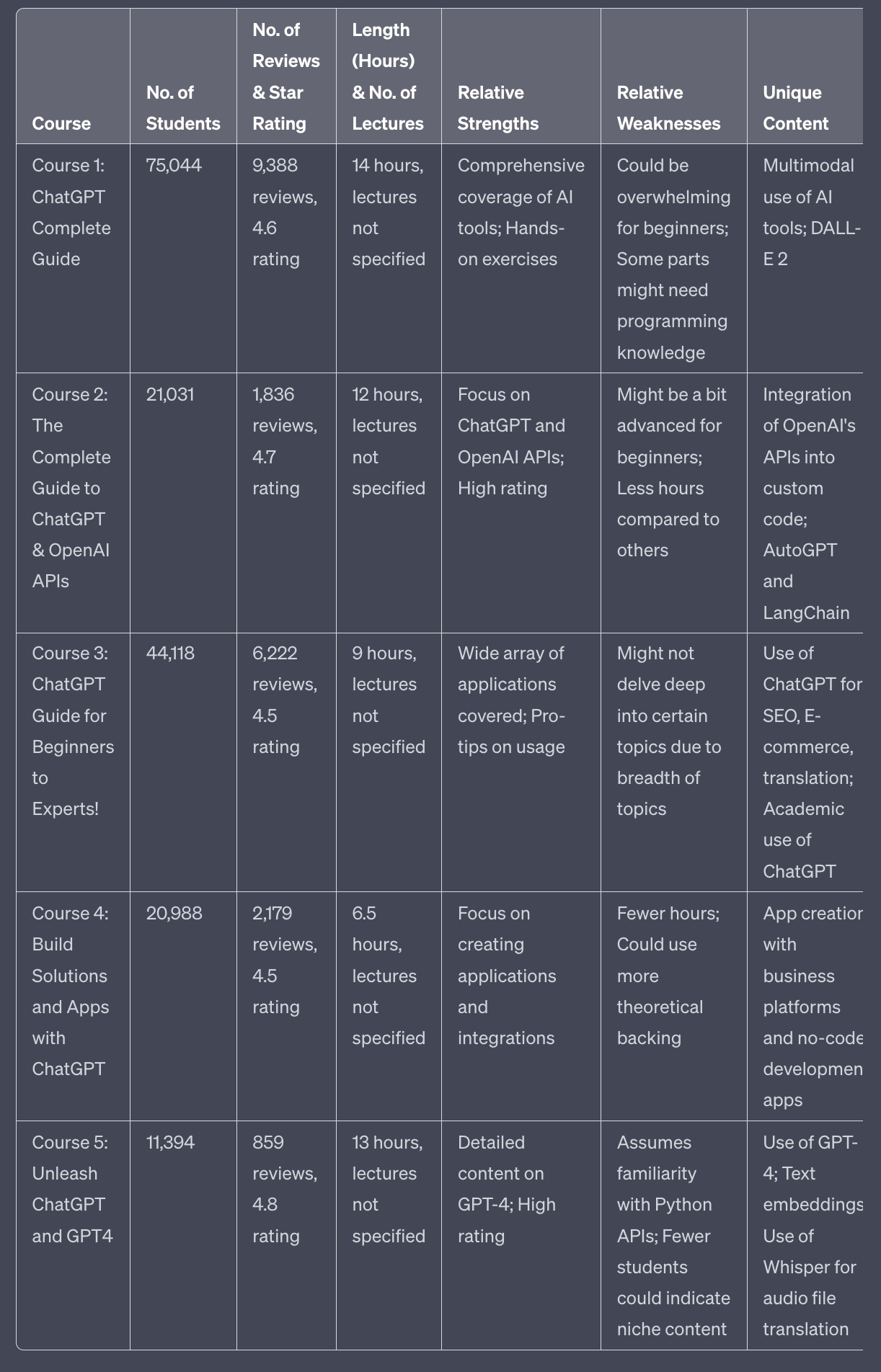
This gives us a comparative analysis of the top 5 Udemy courses in our niche.
Because these are the top 5 they are doing something right – we want to learn from them. So this is invaluable information. In the next step we’ll go a little further with this competitive intelligence.
4. USP/ Gaps in the market
In the same prompt window go ahead and add this prompt below the comparative table.
If you have navigated away from the previous chat look in your chat history to find the comparative analysis again.
Now use this prompt:
Based on the comparative analysis you just completed, propose a course that takes the best from each, and avoids the weaknesses.No additional info needed – ChatGPT will take all the information it needs from the comparative table above.
Prompt Output 💬
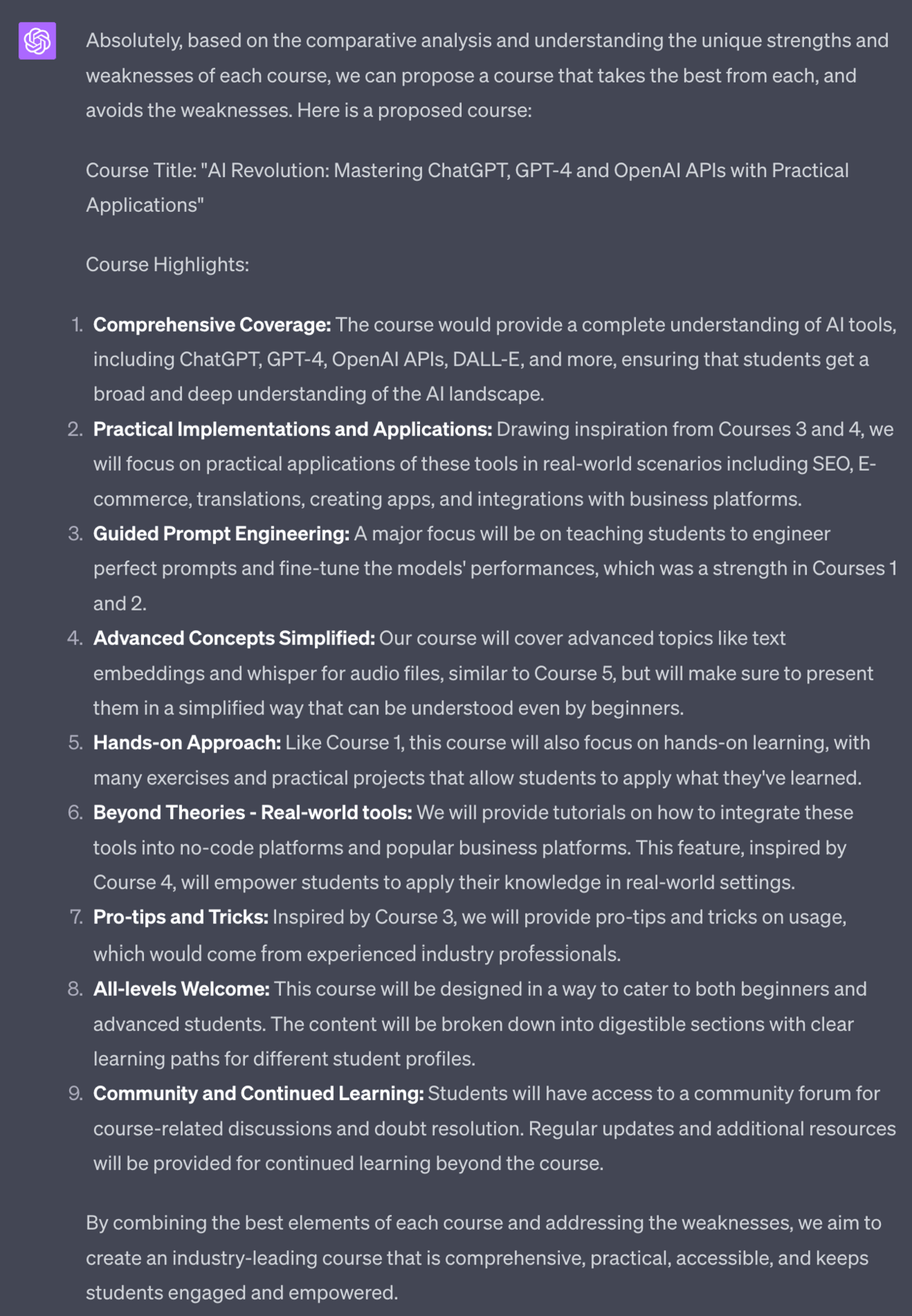
This prompt takes all of the competitor information you provided, all the strengths and weaknesses, and suggests a course that is better than the others.
We will use this list of highlights later when we come to structure the course. So make sure to keep a copy.
5. Course title
Next we want a handful of potential titles for our course.
Use this prompt:
Provide me 10 more potential titles.
Try to include keywords from this list, ordered from most to least important: [keywords]
For the keywords refer back tot the Udemy Marketplace Insights tool and the top search keywords.
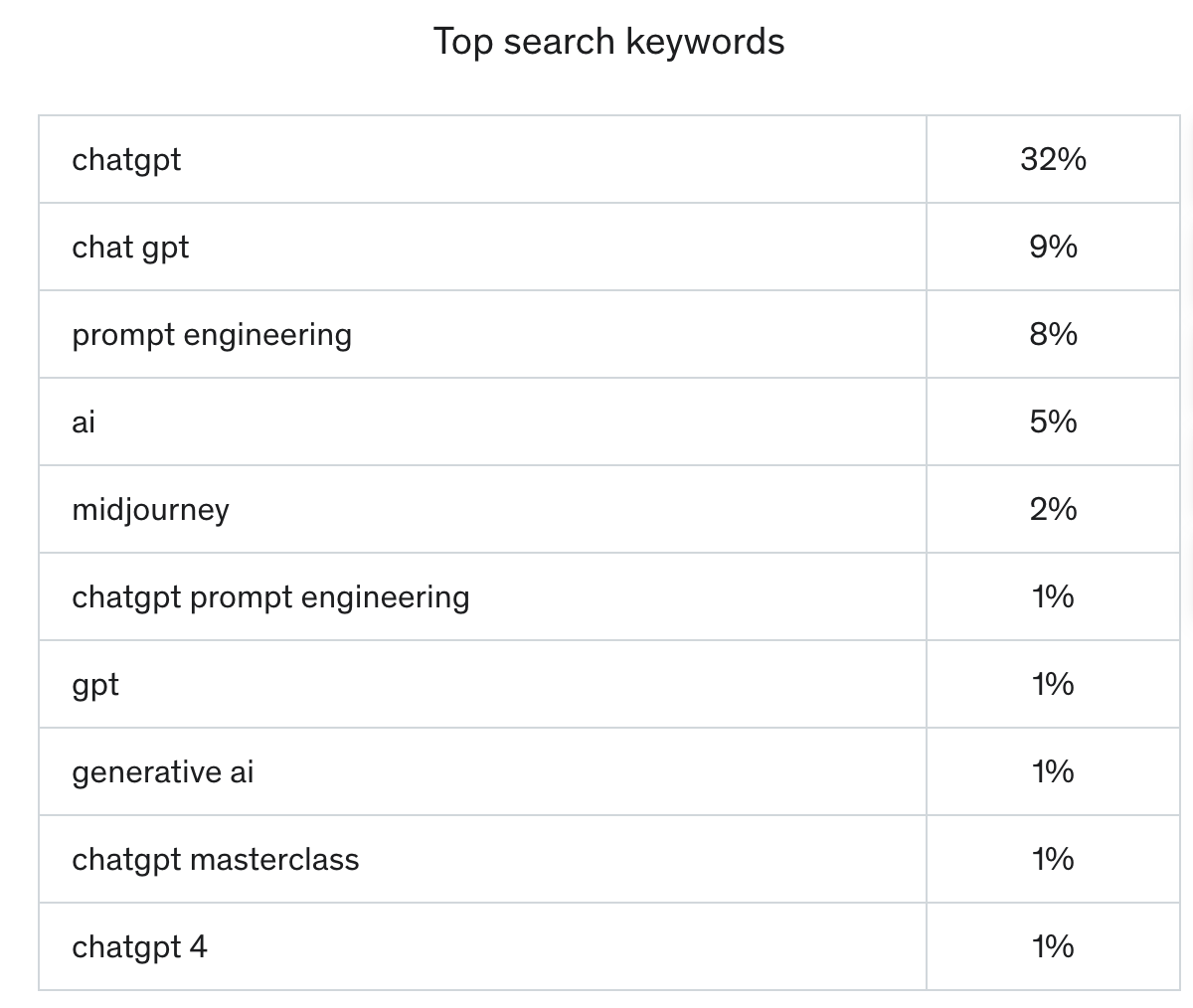
Prompt Output 💬
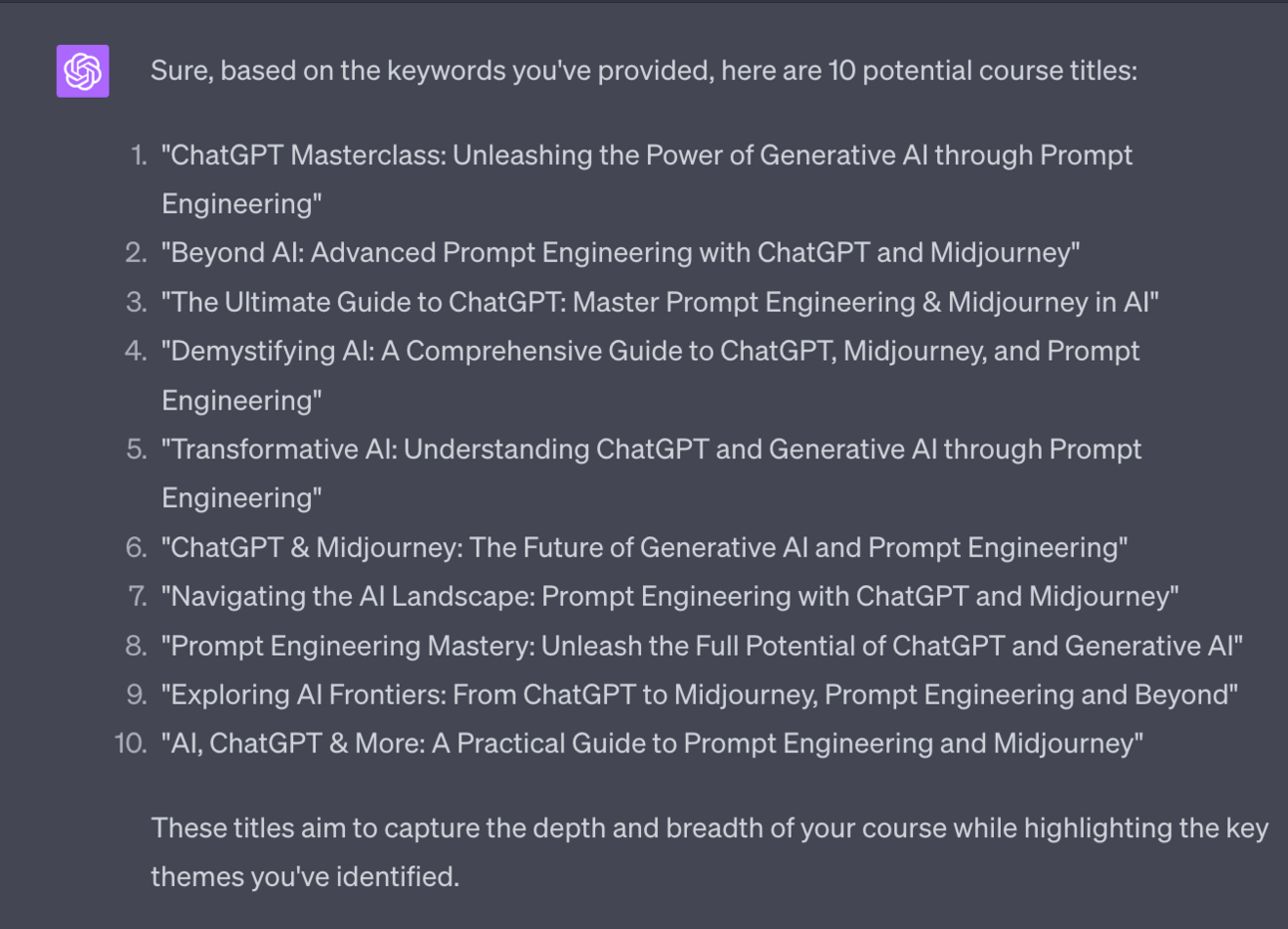
Choose one that includes the keywords but also sounds good. You’ll be better than ChatGPT at choosing this.
Pulling it together
Phew!
In this part we started with idea generation, worked through market and competitive research and came out the other side with a set of guidelines for the “perfect” course as well as a name to go along with it.
That’s a lot of work done. In fact, the most important work.
We’re going to build on these elements, especially the set of guidelines for the perfect course, in the next Part as we start to structure and write the course.
For that, I’ll see you tomorrow!
This week:
Part 1: Course Topic Selection
Part 2: Course Structure
Part 3: Course Scripts
Part 4: Course recording and editing
Part 5: Course marketing
